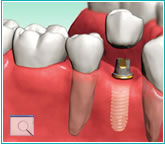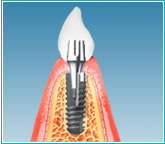Implants

 A dental implant is an artificial root implanted by a surgical procedure into the jawbones.
A dental implant is an artificial root implanted by a surgical procedure into the jawbones.
With its help we
have the possibility to replace one or more missing teeth. In cases where several teeth are missing implants
also make it possible to fix the prosthesis.
| Can anyone have an implant? | How many implants do I need? |
| Whether an implant can be inserted or not mainly depends on the available bone material. In the interest of long-term success it is necessary to possess bones that are of the required width and depth. Smaller amounts of missing bone can be corrected with the help of bone substitute additive materials. The location of the upper sinus cavity (maxillary antrum) on the upper jaw and the proximity of the nerve canal on the lower jaw represent two special problems that have to be considered. We also have to consider some other factors like: heavy smoking, diabetes, neglected oral hygiene as in these cases it is not recommended to have an implant. | At the planning stage we always have to take into consideration the size and the number of missing teeth. Generally we can say that for the substitution of three missing teeth there is need for at least two artificial roots. In the case where all of the teeth are missing, there is need for eight implants in the upper jaw (because of the softer bone structure) and six implants in the lower jaw. We have to note here that the loss of teeth often comes with consequences that make it necessary to prepare a prosthesis even though it is also possible to implant artificial roots. The reason for this is that with the help of the prosthesis we not only replace missing teeth but we also can substitute receded gums and degraded bone. By doing so, we can provide support of the cheeks and lips that have sunken in because of the missing teeth. |
| How long does it take until my denture is ready? | In the long term, what is the expected life span of the implants? |
| The final dental prosthesis can be ready in 3-4 months from the initial surgical procedure. | HWhether the implant is accepted or not will be determined within the first three months following the surgical
procedure. The rate of success for implants is around 95 %. The reason for unsuccessful attempts could be for
example unfavourable and insufficient blood supply of the bone, and/or heavy
smoking during the first few weeks following the operation. After finishing the procedure of tooth/teeth replacement by implants, regular (at least once a year) check-ups give us the possibility to intervene and make corrections before anything serious can occur. This also means that the secrets of the long-term success are regular check-ups and careful oral hygiene. |





